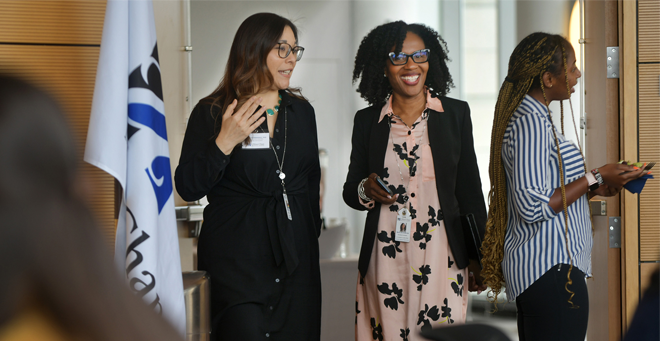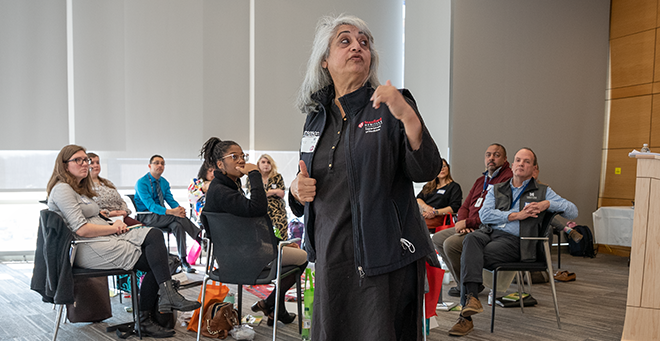The Diversity and Inclusion Office at UMass Chan Medical School hosted the two-day Diversity Summit on Oct. 11 and 12, illuminating progress toward meeting the institution’s strategic goal to foster diversity, equity, inclusion and belonging across campus. The event included a poster fair, plenary session and a series of online breakout discussions.
“It is sometimes difficult to see the progress of diversity, equity, inclusion and belonging work. Today is an opportunity for us to really lean into the transformative power of this work,” said Marlina Duncan, EdD, vice chancellor for diversity and inclusion, addressing attendees at the plenary session.
Remarking on the IMPACT 2025 strategic plan, Chancellor Michael F. Collins said, “I think as an institution, we should feel very heartened that the values of diversity, equity, inclusivity, civility, mutual understanding and shared humanity helped to guide our strategic direction, and shape a campus culture, and indeed, our academic community.”
The poster fair in the Medical School lobby opened the Diversity Summit where more than 27 faculty, staff and students presented innovative ways to support a diverse, inclusive and equitable learning and working environment.
“There are a lot ‘ground up’ efforts going on at UMass Chan,” said Olajumoke Megafu, MD, a surgery resident who presented the poster, “Diversifying the Surgical Workforce: Understanding Barriers to Inform Solutions A Pilot Study.” It highlighted a pipeline project produced by Dr. Megafu called, “A Day in the Life of a Surgeon” that brought 60 undergraduate students to campus to educate and expose people from underrepresented backgrounds to the possibilities of exploring medicine, particularly surgery, as career options.
The posters represented the breadth and depth of the diversity work happening across campus, including several that conveyed work inspired by the Diversity and Equity Action Plan model laid out by the Diversity and Inclusion Office, in which departments evaluate their roles through a DEI lens. For example, the Department of Population & Quantitative Health Sciences and the Office of Communications detailed the work of their Diversity Action Committees. The myriad pipeline programs UMass Chan has to offer were also reported through posters.
The summit continued with the plenary session during which key stakeholders gave updates on UMass Chan’s progress in the four areas of focus laid out in the diversity, equity and inclusion pillar of its strategic plan. In the area of building an inclusive culture and climate, Sharina Person, PhD, the Dr. Marcellette G. Williams Senior Scholar and vice chair and professor of population & quantitative health sciences, presented a deep dive into the 2023 Diversity Engagement Survey’s results.
“The survey connects engagement theory to inclusion and diversity constructs, and specifically we are measuring engaging the heart. The idea behind engaging the heart is if you can engage the heart of an individual, they are going to feel connected emotionally, it is going to be easier to retain them at your institution,” Dr. Person said.
Person explained the results, noting areas in which UMass Chan was ranked favorably and naming areas in need of improvement. She also commended UMass Chan for its 50 percent response rate.
Milagros Rosal, PhD, professor of population & quantitative health sciences and vice provost for health equity, highlighted four programs that focus on recruitment and retention, including: the Health Equity Recruitment and Career Advancement Program, a compensation benefit for faculty who help fulfill the health equity goal of our educational and clinical mission; the Cluster Hire Program that facilitates recruitment and retention of tenure-track faculty from groups underrepresented in medicine; the Investigator Career Advancement Program that provides career development support and facilitates relationships in the UMass Chan community for new hires; and the Diversity KL2 Program, a NIH-funded program with additional institutional funding to attract and further support the career advancement of junior clinical and translational scientists from backgrounds underrepresented in medicine and the biomedical sciences.
Reiterating research that confirms diversity within faculty enriches the experience of learners and fosters innovation and creativity in research, Dr. Rosal believes. “The intention behind this work will put UMass Chan at the forefront of excellence in all mission areas,” she said.
Taking a closer look into how operationalizing the mission has taken root, a panel of staff and faculty who, together with their departments, participated in piloting their own Department Equity Action Plan, shared why they participated in the pilot, key learnings and challenges. The importance of assessment and giving a clear direction for how to approach diversity, inclusion and belonging; a deep inquiry into internal equity as it relates to promotion; and helping with goal setting were some of the takeaways named.
“We recognize that we are stewards of this university community, and we continue to strive to be worthy of that trust and to leave the community and the UMass institution better than then we found it,” said Terence R. Flotte, MD, the Celia and Isaac Haidak Professor, executive deputy chancellor, provost and dean of the T.H. Chan School of Medicine, in his closing remarks.
Dr. Flotte categorized UMass Chan as being in “the opportunity business” noting it is the institution’s job to provide opportunities for students, postdocs, residents and other learners to pursue their education and career creation, and for all members of the community to have the opportunity to take part in that mission.
“I think this is one of the things that you find over time, that people are willing to work hard and put up with a lot if they feel that they’re serving a higher mission,” Flotte continued.
The summit’s second day included the following breakout sessions: Developing and Enhancing Diversity Initiatives through a Diversity and Equity Action Plan; Restorative Justice; and the Diversity Engagement Survey: Developing Community Based Solutions and Creating a Sense of Belonging in the Workplace.
Additionally, the Diversity and Inclusion Office distributed its annual report at the event.

